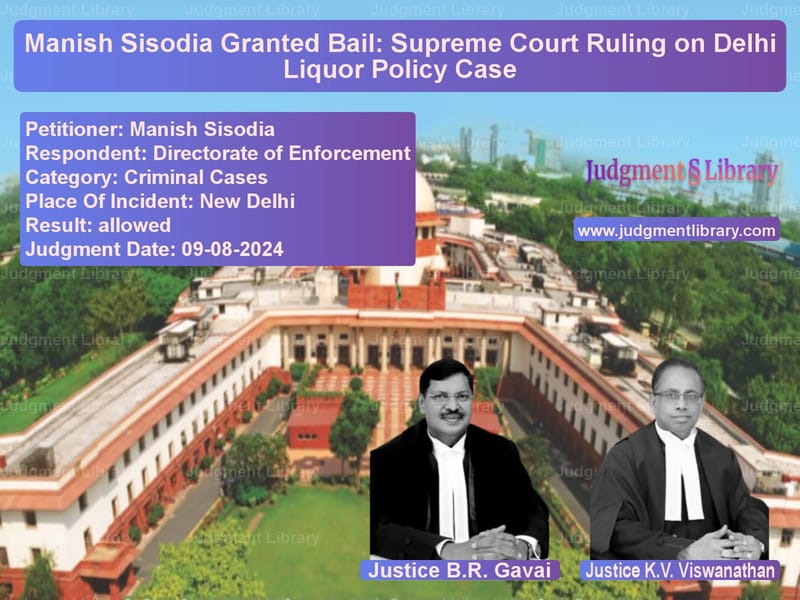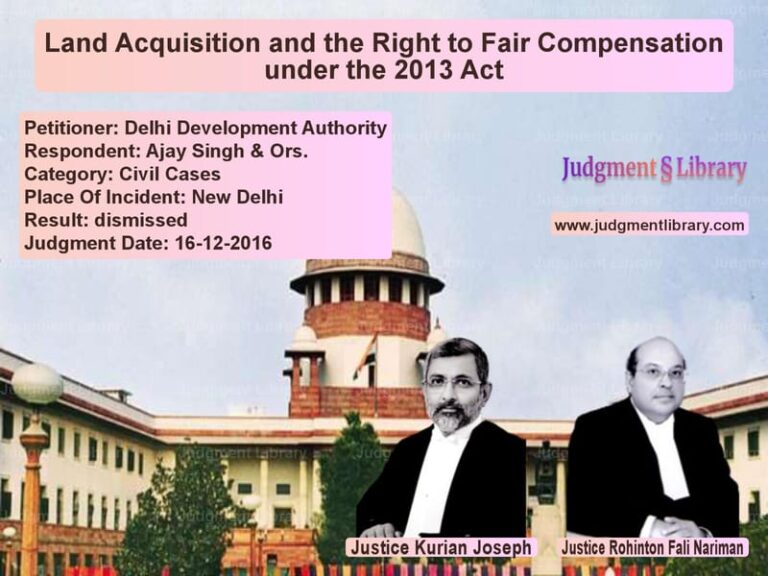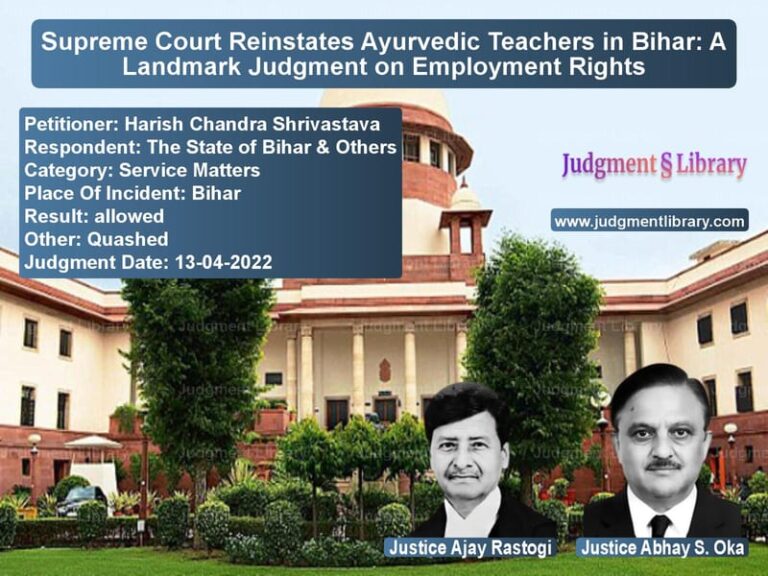Manish Sisodia Granted Bail: Supreme Court Ruling on Delhi Liquor Policy Case
The Supreme Court of India recently delivered a significant ruling in the case of Manish Sisodia vs. Directorate of Enforcement, granting bail to the former Deputy Chief Minister of Delhi in connection with the alleged Delhi Liquor Policy scam. The case, which involved serious allegations of corruption, money laundering, and violations under the Prevention of Money Laundering Act (PMLA), had gained national attention due to its political ramifications.
Background of the Case
The controversy began when the Lieutenant Governor of Delhi alleged irregularities in the Delhi Excise Policy for the year 2021-22. This led to an inquiry initiated by the Ministry of Home Affairs, culminating in the registration of an FIR by the Central Bureau of Investigation (CBI) on August 17, 2022, followed by an Enforcement Directorate (ED) case on August 22, 2022.
Manish Sisodia was arrested by the CBI on February 26, 2023, and later by the ED on March 9, 2023. The case underwent multiple rounds of legal scrutiny at the trial court, the Delhi High Court, and the Supreme Court, making this the third time the matter had reached the apex court for bail consideration.
Petitioner’s Arguments
Manish Sisodia’s counsel, led by senior advocate Dr. Abhishek Manu Singhvi, presented the following arguments:
- The case against him was politically motivated, aimed at suppressing opposition voices.
- The CBI and ED failed to establish any direct evidence linking him to corruption or money laundering.
- The allegations primarily relied on witness statements and circumstantial evidence.
- The right to a speedy trial, a fundamental right under Article 21 of the Constitution, was being violated due to excessive delays in proceedings.
- The number of witnesses (over 493) and voluminous documentary evidence (69,000 pages) made a speedy trial impractical.
- His prolonged incarceration without a trial effectively amounted to punishment without conviction.
Respondent’s Arguments
The Directorate of Enforcement and the Central Bureau of Investigation opposed the bail plea, arguing:
- Manish Sisodia was a key architect of the excise policy and personally benefited from illegal commissions.
- He played a direct role in policy manipulations favoring a select group of liquor traders.
- Allowing him bail would risk witness tampering and destruction of evidence.
- The case involved a deep-rooted financial crime, requiring stringent scrutiny under Section 45 of PMLA.
- Applications filed by Sisodia’s legal team in the trial court were deliberate attempts to delay proceedings.
Supreme Court’s Observations
The Supreme Court, after examining the case details, made the following key observations:
- Prolonged incarceration without trial violates fundamental rights, particularly the right to a speedy trial.
- Given the complexity of the case, the trial was unlikely to conclude in the near future.
- The presence of voluminous evidence and the number of witnesses made it impractical to keep Sisodia in custody indefinitely.
- The case against him was primarily based on documentary evidence, which had already been secured.
- The court found no substantial risk of him fleeing or influencing witnesses, given his high-profile status.
- Section 45 of PMLA, while stringent, does not override fundamental rights.
Final Judgment
On August 9, 2024, the Supreme Court ruled in favor of Manish Sisodia:
- He was granted bail in both the CBI case (RC0032022A0053 of 2022) and the ED case (HIU-II/14/2022).
- He was required to furnish bail bonds of Rs. 10,00,000 with two sureties.
- He must surrender his passport to prevent flight risk.
- He must report to the investigating officer twice a week.
- He was barred from contacting witnesses or interfering with the investigation.
Implications of the Judgment
The Supreme Court’s ruling sets an important precedent for cases involving political figures and allegations of financial irregularities. Key takeaways include:
- Reaffirmation of the Right to Bail: The judgment underscores that prolonged incarceration without trial is unconstitutional.
- Burden of Proof on the Prosecution: While PMLA cases require stringent scrutiny, the prosecution must provide substantive evidence beyond circumstantial claims.
- Judicial Balance in High-Profile Cases: The court ensured that legal proceedings remain fair, regardless of political affiliations.
- Limiting Misuse of Preventive Detention: The ruling acts as a safeguard against prolonged pre-trial detentions based solely on allegations.
Conclusion
The Supreme Court’s decision to grant bail to Manish Sisodia marks a significant moment in India’s judicial history. By emphasizing the right to a speedy trial and ensuring fair application of bail provisions under PMLA, the ruling reinforces the principle that justice must not only be done but must be seen to be done.
Petitioner Name: Manish Sisodia.Respondent Name: Directorate of Enforcement.Judgment By: Justice B.R. Gavai, Justice K.V. Viswanathan.Place Of Incident: New Delhi.Judgment Date: 09-08-2024.
Don’t miss out on the full details! Download the complete judgment in PDF format below and gain valuable insights instantly!
Download Judgment: manish-sisodia-vs-directorate-of-enfor-supreme-court-of-india-judgment-dated-09-08-2024.pdf
Directly Download Judgment: Directly download this Judgment
See all petitions in Money Laundering Cases
See all petitions in Bail and Anticipatory Bail
See all petitions in Fraud and Forgery
See all petitions in Public Interest Litigation
See all petitions in Judgment by B R Gavai
See all petitions in Judgment by K.V. Viswanathan
See all petitions in allowed
See all petitions in supreme court of India judgments August 2024
See all petitions in 2024 judgments
See all posts in Criminal Cases Category
See all allowed petitions in Criminal Cases Category
See all Dismissed petitions in Criminal Cases Category
See all partially allowed petitions in Criminal Cases Category







